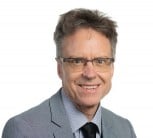August 18, 2021

Professor Walwyn completed his undergraduate studies at the University of Cape Town and has been doing research at the University of Pretoria (UP) for the past 12 years.
He says UP affords him the ideal environment in which to undertake his research.
“I have access to all the library resources, a cohort of students to assist with the work, colleagues with whom I can interact and collaborate, a well-managed infrastructure to support my applications for funding, and all the common research administration functions.”
Prof Walwyn is a transdisciplinary scholar who is focused on two important research areas: localisation of manufacturing in the health and energy sectors, and transformation of socio-technical systems, especially systems for mobility and electricity. For this work, he uses a combination of techno-economics, policy mix theory and transitions theory to identify turning points for localisation and transformation.
The focus of his research is reaching four important Sustainable Development Goals (SDGs): SDG 7 (Affordable, Reliable, Sustainable and Modern Energy for all), SDG 11 (Sustainable Cities and Communities), SDG 13 (Women, Youth and Local and Marginalised Communities) and SDG 4 (Quality Education). In essence, the attainment of a net-zero global economy is both an imperative and a massive challenge.
“Through my research, I hope to make a small contribution to this broader goal,” he says. “The big issue in this work is the ‘theory of change’. My perspective of the latter is that change will only happen when we can effectively confront and challenge the legacy and pathway dependencies of the present socio-technical regimes.”
Prof Walwyn says he research “is rather just small contributions to the national discourse on energy systems and how these can be transformed”. However, he adds, his research matters because we have no choice but “to make the energy transition”.
Within his academic discipline, he is part of two research teams, one of which is working on white hydrogen and the other on the development of hardware/software for vehicle-to-grid systems.
He says his research has been inspired by the work of Prof Mark Swilling and Prof Johan Schot. Prof Swilling is the co-director of the Centre for Sustainability Transitions at Stellenbosch University, and writes about sustainability and the importance of Ukama or kincentric ecology. Prof Schot is professor of global comparative history and sustainability transitions at the Centre for Global Challenges at Utrecht University in the Netherlands, and writes about deep transition and changing societal meta-values.
Prof Walwyn adds that he admires all the major contributors to his field, including people such as Bengt-Ake Lundvall, an emeritus professor of economics at Aalborg University in Denmark, and Frank Geels, a professor of system innovation and sustainability at the University of Manchester in the UK.
Prof Walwyn dreams of a rapidly growing renewable energy sector that will reduce South Africa’s carbon footprint, empower local communities and create green jobs.
He urges school learners or undergraduates who are interested in his field to read, study and understand. Knowledge and critical analysis are essential in the 21st century.
“The world needs you – you just need to discover for yourself how one can transform agency and capability into action. Follow your passion, but remain evidence-based.”
As far as hobbies go, Prof Walwyn says he has many diverse interests.
“I play the flute. I do trail runs, road runs, mountain bike races and road bike events. I hike, walk, swim and surf. And I knit, mainly socks, leg warmers and beanies. If you are ever in need, just ask me!”
Prof Walwyn’s research focus areas
A sustainability transition is defined as “the long-term, multi-dimensional and fundamental transformation processes through which established socio-technical systems shift to more sustainable modes of production and consumption”. Examples of such transitions include changes from non-renewable (such as coal and gas) to renewable (such as wind and solar) sources of electrical energy, from internal combustion engines to fuel cell electric vehicles and the adoption of green building practices.
These transitions are essential if the international agreements on climate change, such as COP21, are to be met, simultaneous to the elimination of poverty and inequality (SDGs 1 and 10). Although techno-economics is only one of several drivers of such transitions, it is a sine qua non in developing countries. Prof Walwyn’s work has looked at how changes in the techno-economics of energy systems are supporting or preventing energy transitions.
In the area of health sector localisation, he works on vaccine and pharmaceutical manufacturing. The work is particularly important in the context of the recent COVID-19 pandemic. His initiative in 2002 to maintain local technological capability in the vaccine value chain is now being recognised.
In all this work, he has attempted to understand the reasons why science, technology and innovation do, or do not, lead to economic development, and has used a number of theoretical frameworks in his research, including technological innovation systems, innovation policy mix, niche experimentation, technological capability, historical institutionalism, sustainability transitions and neo-classical economics.
 Story
Story
University of Pretoria (UP) researchers have found that the antioxidant content of certain types of tea can be likened to that found in recommended portions of fruit and vegetables.
 Infographic
Infographic
Half a cup of black tea, oolong tea or green tea contained the same amount of antioxidants with radical scavenging capabilities (RSC) as that of a 200mg vitamin C tablet.
 Story
Story
Researchers at the University of Pretoria (UP) may have identified the gene that is responsible for diet-related obesity. By exploring the role of the novel gene Slc7a8, they have made a potential breakthrough in current knowledge about the cellular mechanisms that drive fat accumulation. This understanding is crucial in developing effective treatments.
Copyright © University of Pretoria 2025. All rights reserved.
Get Social With Us
Download the UP Mobile App